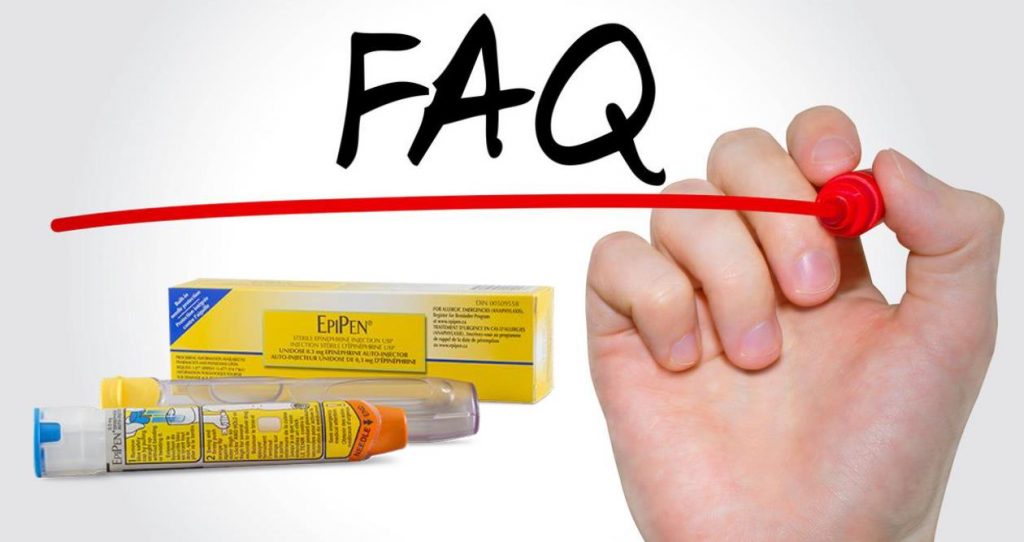*Update as of February 21, 2019: For the most recent update regarding EpiPen and EpiPen Jr availability, click here.*
 To help answer the most common questions about the current EpiPen® shortage, we have compiled this list of FAQs. We hope you find it helpful.
To help answer the most common questions about the current EpiPen® shortage, we have compiled this list of FAQs. We hope you find it helpful.
For further questions about this shortage, please contact Pfizer Canada directly at 1-877-EPIPEN1 (1-877-374-7361).
Q. Why is there a shortage of EpiPen auto-injectors in Canada?
A. According to Health Canada and Pfizer Canada, this shortage is due to a manufacturing issue with the EpiPen 0.3 mg format.
Q. When will the shortage end?
A. According to Pfizer Canada, the next shipment of EpiPen’s to the Canadian market will be in late August 2018. Until this new shipment arrives, shortages of EpiPen can be expected at pharmacies. The EpiPen Jr continues to be available although the supply is limited and is being carefully managed at the national level.
Q. Why is EpiPen the only epinephrine auto-injector in the Canadian market? Will there be more suppliers coming to the market?
A. We have been in contact with Health Canada, all provincial Ministries of Health, and alternate suppliers approved in Canada like Kaléo (Allerject/Auvi-Q), Taro, Valeant Canada (Emerade), on what we can do to expedite their entry to market. As an immediate ask, we have inquired about the possibility of having these suppliers offer temporary supply of their devices to offset this shortage period. We will share more information if and when these devices will become available in Canada.
Q. Can I use an expired EpiPen?
A. As per Health Canada, during this shortage period, if you are experiencing an anaphylactic reaction and only have a recently expired auto-injector, use the expired product and immediately call 9-1-1 or local emergency services. Keep in mind that the expiry date applies to the last day of the month noted on the device. For example, if your device expires in August, it remains valid (not expired) until August 31st.
Q. What can I do if the pharmacy does not have any auto-injectors in stock?
A. If your local pharmacy does not have any EpiPens, try checking with other pharmacies in your area. If a new auto-injector is not available, a recently expired device may be used to treat an anaphylactic reaction in an emergency situation during this shortage period.
Q. Is the use of vials of epinephrine and a syringe an option for patients?
A. Use of vials of epinephrine and a syringe is not recommended for non-medical professionals. There are risks associated with inappropriate dosing and the amount of time required to draw up a dose as well as a lack of training on the proper administration of the injection.*
Q. Can two EpiPen Jr auto-injectors be substituted for the use of one EpiPen auto-injector?
A. During this shortage period, we recommend keeping existing EpiPens past their expiry date (the potency of which usually is maintained beyond this), using them in case of emergency and then calling 9-1-1 or local emergency services. For those needing a new prescription, two EpiPen Jr devices do contain a total of 0.3 mg of epinephrine, the same amount contained in an EpiPen auto-injector. However, it isn’t ideal to substitute with EpiPen Jr as the needle length is shorter and the medication may not be fully delivered. Such substitution should only be considered as a last resort, but is still preferable to the use of epinephrine vials and syringes.*
Given that there is limited supply of EpiPen Jr currently in the market, please be mindful about requesting these devices to replace the EpiPen 0.3 mg dose. We want to ensure children who require the EpiPen Jr dosage have access to this life-saving medication.
Q. If epinephrine is not available, should antihistamines be used?
A. Epinephrine is the only treatment shown to stop an anaphylactic reaction. The main benefit of antihistamines is in treating hives or skin symptoms. If epinephrine is not available, call 9-1-1 or your local emergency services, tell them you are having an anaphylactic reaction, and get to hospital, preferably by ambulance.*
Q. What should I tell my child’s school/child care provider about the EpiPen shortage?
A. Share the information from Health Canada with your child’s school/childcare provider to advise them that additional devices for their setting may not be possible at this time and the devices provided may be past their expiry date.
Tips for daily management
We encourage you to follow these tips to help you manage during this shortage situation:
- Check your EpiPen and EpiPen Jr devices for expiration dates noted by month and year. They do not expire until the last day of the month listed. For example, if your device expires in August, it remains valid (not expired) until August 31st.
- Only get an EpiPen at this time if it’s needed, be mindful in requesting additional EpiPens beyond what is necessary to allow for as many people as possible to have access to this life-saving medication.
- If your local pharmacy does not have any auto-injectors in stock, please check with other pharmacies in your area. If a new auto-injector is not available, a recently expired device may be used to treat an anaphylactic reaction in an emergency situation during this shortage period.
- Share this information with your child’s schools/daycare, they should be made aware of this situation and not be requesting additional devices from families at this time.
- Follow our safety tips on how to be prepared and prevent reactions from happening.
*This information has been medically reviewed by Dr. David Fischer, Dr. Edmond Chan and Dr. Julia Upton, Canadian Society of Allergy and Clinical Immunology.
Tags: EpiPen, faq, shortage